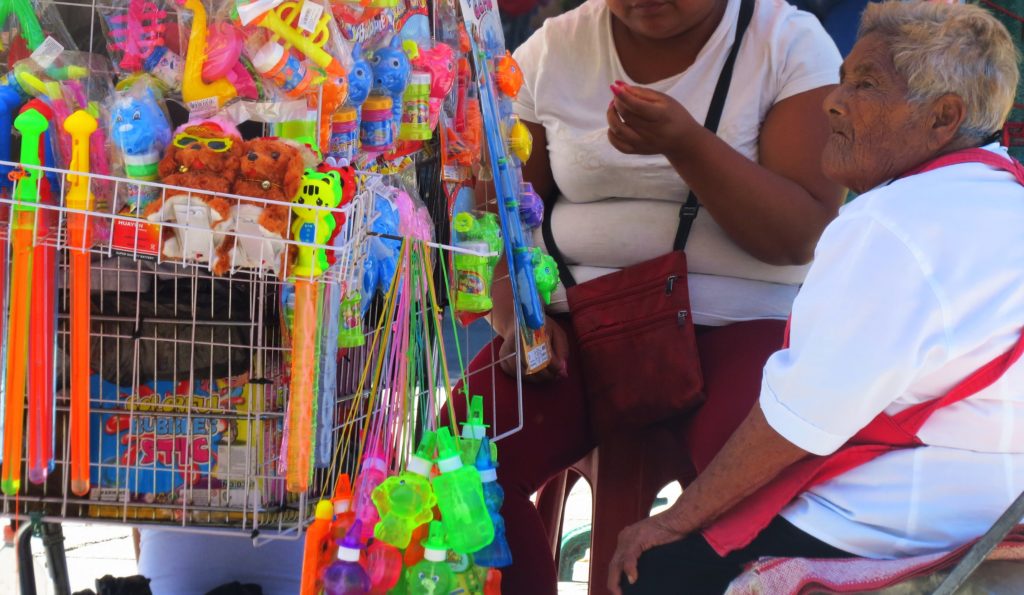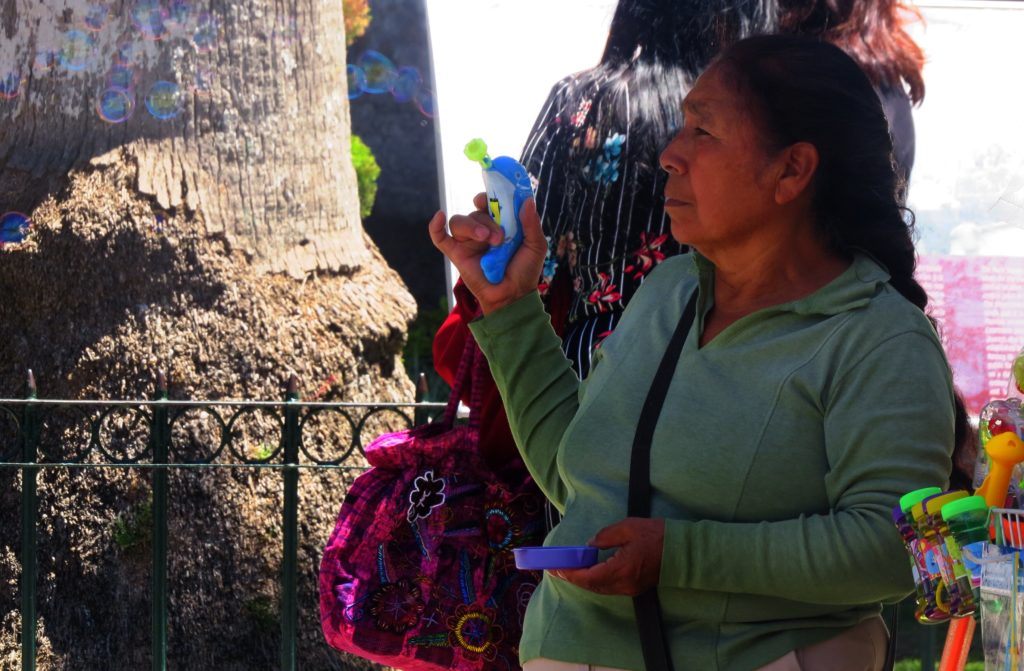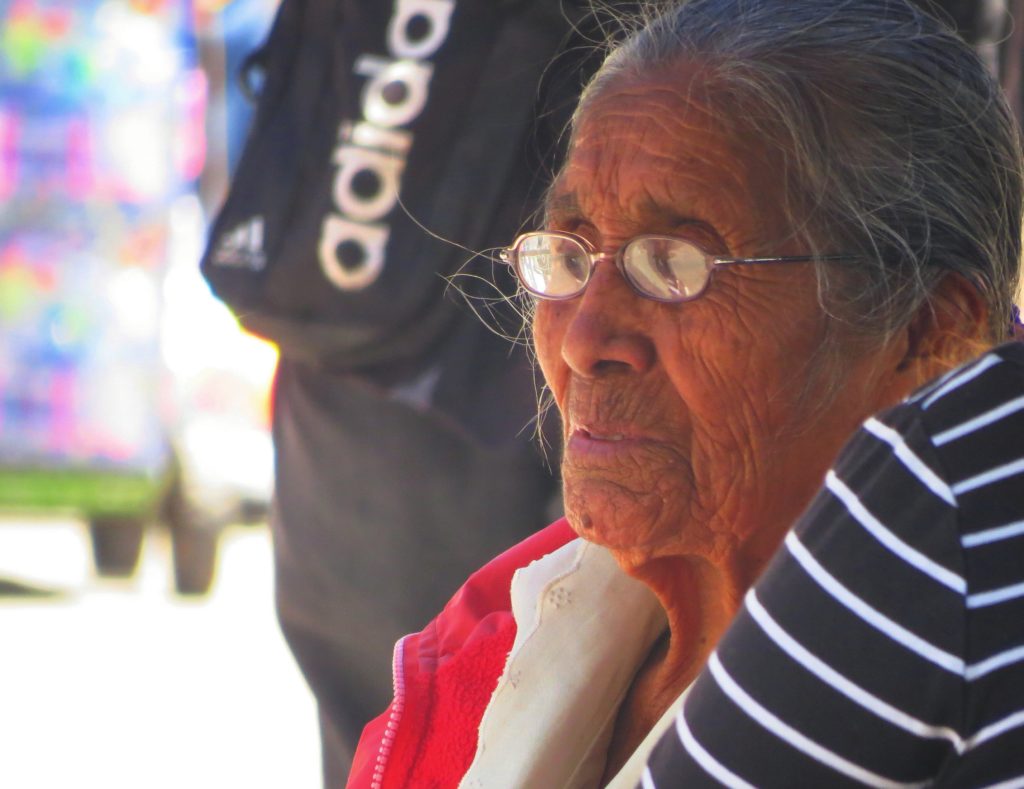
In Mexico, over 30,000 people over the age of 60 are working long unpaid shifts as bag packers in supermarkets. It’s part of a government program where the Institution for Older Adults, INAPAM, helps private companies obtain low-paid and unpaid labor from those over 60. The number cited is from 2013 and is likely much higher by now, but INAPAM provides little information to the public.
Near where I live, in a Comercial Mexicana supermarket in the center of Puebla, Mexico there are two older people standing by the end of each open check out. They’re dressed in the store uniform, and they quietly pack shopping bags, never daring to ask for a tip – their only income. A lot of people don’t give them anything. Others bring their own bags and pack them themselves, while others go through the change they are given and hand over a 1 or 2 peso coin (5-10 US cents).
These unpaid laborers are up to 89 years old. All of them would have five to seven decades of life and work experience, but have ended up back in supermarkets where many teenagers start their waged work life. They have no work contract and receive no benefits. However, they do have obligations to the company, such as spending their own money to buy a uniform, and completing a full working day.
According to one Mexican daily, these workers frequently have to perform other duties such as cleaning and stocking, for no pay or tips. And although they aren’t being physically or violently forced to do this work, they don’t really have a lot of choice. Of the 13 million Mexicans over 60, only a quarter receive a pension, and even those people are only receiving 580 pesos (US$35) per month – not even enough to cover a water bill in Puebla.
I called INAPAM in Puebla and talked to social worker Norma Olivares about this issue. I asked her if the Voluntary Packing of Products program could constitute extreme exploitation. She explained that the program is the result of “corporate agreements for collaboration” where “seniors receive an income according to the tips given by clients … They are volunteers because the supermarkets request it.” I said that a lot of old people don’t have an income and so it isn’t really a choice, and she responded that “the majority have a pension though, it’s like extra income.”
Starbucks opens “first shop run by older adults”

In August this year a Starbucks store in Mexico City boasted to the media about opening a shop supposedly “run” by older Mexicans, though many of the workers there are still quite young. Starbucks couched the measure as part of their inclusion policy, but did not provide any details about wages or conditions.
The move is also part of an INAPAM program. The director general of INAPAM, Aracely Escalante Jasso justified it by claiming that older people “are very active, they want to keep being productive and useful to their family and society.” In the press release, Escalante did not comment on the government’s responsibility to look after people who have already worked for decades. Further, to assume the elderly have nothing more useful or creative they could be doing is typical of the disrespect they face in Mexican society, and globally.
“(When you’re old) you have to get prepared to leave (life) with pride and dignity and be grateful for life, as an accumulation of experiences. But we feel abandoned and disposable. The loneliness is tough, you’re not respected, and you lose your independence. For me, that’s the hardest part,” Eva Aran Vidal, 72, in Puebla city, told me.
“There is abuse and poor treatment (of old people) everywhere. Those with pensions often can’t go to withdraw them alone. They might have physical disabilities, or they don’t know where to go. The people who take them – sometimes their children – steal their money. How? If they go in taxi, well they trick them and tell them the pension hasn’t been deposited yet,” she explained.
Abandoning older Mexicans

Mexico has a massive informal sector, meaning that 60% of workers have no worker rights. The situation is even worse among older people, with just 3.8% of adults over 60 being formally employed. Many older-aged workers are getting by by selling products in the street in temporary stalls, or on public transport, while others work in agriculture. Having been informal workers their whole lives, they haven’t experienced economic security or been able to save. Informal workers don’t have access to any social security or to the social security hospitals and health care services. Furthermore, 28.7% of women and 19.9% of men over the age of 60 don’t know how to read or write, and that figure increases to 53.2% and 37.1% in rural areas.
Meanwhile, the number of geriatricians is too low, and nursing homes are rare and cost 15-35,000 pesos a month – the equivalent of a doctor’s full time wage. There are also few services providing the elderly with care or assistance on transport, meaning they often either become dependent on their families, or live in extreme poverty or on the street.

A 68-year-old bricklayer told the Mexican newspaper Excelsior that with 54 years working, he had no pension to fall back on and could only beg and keep working to survive. On top of these sorts of difficulties, over half of those over 60 – 8.1 million people – have a disability or physical limitation. Also, studies have confirmed that they face regular abandonment, violence, psychological abuse, and discrimination – 60% of people in one Mexican survey saw older people as a burden.
Meanwhile, 93.3% of people over 60 are providing a large amount of unpaid labor around the home; preparing food, cleaning and running homes, looking after grandchildren, and more. That figure does not include unpaid labor through government programs.
Somewhat hopeful changes ahead
President-elect Andres Manuel Lopez Obrador (AMLO) is due to take office in December and he has promised to double pensions from January 1. From that date, pensions will be 1,160 pesos per month (US$ 64), regardless of other income. However, the eligible age has been pushed back from 65 to 68, except for indigenous people. While the move overall is a positive one, it’s clearly not enough. So far, there doesn’t seem to be any plans to promote better treatment of old people, encourage their involvement in society, or support their basic rights.
Tamara Pearson is a journalist based in Puebla, Mexico. She is the author of The Butterfly Prison, blogs at Resistance Words and can be found on Twitter @pajaritaroja.
